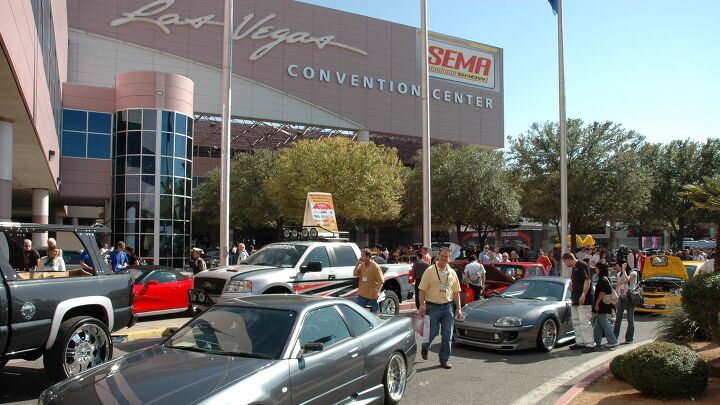SEMA CEO: Electrification Will Cost Aftermarket Jobs

The Specialty Equipment Marketing Association, or SEMA, represents thousands of aftermarket and automotive parts companies, giving it a unique level of sensitivity to changes in emissions, safety, and other vehicle regulations. Recent changes to EPA regulations could bring a seismic shift in the automotive market, making a significant portion of new vehicle sales electric early next decade. SEMA’s President recently shared the organization’s thoughts on the issue, which are predictably skeptical of the changes.
Mike Spagnola’s letter was posted on the SEMA site and said that the organization’s more than 7,000 members “have significant concerns regarding the impact of these proposed regulations on automotive small businesses.” He said the more than one million employees in the aftermarket industry are often overlooked in the push to electrify.
SEMA wants the government to be “technology neutral,” and Spagnola said the organization advocates “for the ability of consumers and the marketplace to choose what works best for them.” Though many companies are already working on aftermarket products for electric vehicles, it’s clear that SEMA views a widespread shift to EVs as a threat to its members.
“The specialty automotive aftermarket business has been built around the internal combustion engine,” Spagnola said. “It is also the same industry that has led the way in fuel innovations and conversions of old vehicles into new and cleaner technologies. Yet it is clear from the Biden administration's actions and words that electrification is their technology of choice.”
[Image: 6th Gear Advertising via Shutterstock]
Become a TTAC insider. Get the latest news, features, TTAC takes, and everything else that gets to the truth about cars first by subscribing to our newsletter.

Chris grew up in, under, and around cars, but took the long way around to becoming an automotive writer. After a career in technology consulting and a trip through business school, Chris began writing about the automotive industry as a way to reconnect with his passion and get behind the wheel of a new car every week. He focuses on taking complex industry stories and making them digestible by any reader. Just don’t expect him to stay away from high-mileage Porsches.
More by Chris Teague
Latest Car Reviews
Read moreLatest Product Reviews
Read moreRecent Comments
- 28-Cars-Later "Farley expressed his belief that Ford would figure things out in the next few years."Ford death watch starts now.
- JMII My wife's next car will be an EV. As long as it costs under $42k that is totally within our budget. The average cost of a new ICE car is... (checks interwebs) = $47k. So EVs are already in the "affordable" range for today's new car buyers.We already have two other ICE vehicles one of which has a 6.2l V8 with a manual. This way we can have our cake and eat it too. If your a one vehicle household I can see why an EV, no matter the cost, may not work in that situation. But if you have two vehicles one can easily be an EV.My brother has an EV (Tesla Model Y) along with two ICE Porsche's (one is a dedicated track car) and his high school age daughters share an EV (Bolt). I fully assume his daughters will never drive an ICE vehicle. Just like they have never watched anything but HiDef TV, never used a land-line, nor been without an iPad. To them the concept of an ICE power vehicle is complete ridiculous - you mean you have to STOP driving to put some gas in and then PAY for it!!! Why? the car should already charged and the cost is covered by just paying the monthly electric bill.So the way I see it the EV problem will solve itself, once all the boomers die off. Myself as part of Gen X / MTV Generation will have drive a mix of EV and ICE.
- 28-Cars-Later [Model year is 2010] "and mileage is 144,000"Why not ask $25,000? Oh too cheap, how about $50,000?Wait... the circus is missing one clown, please report to wardrobe. 2010 AUDI A3 AWD 4D HATCHBACK PREMIUM PLUS
- 28-Cars-Later So Honda are you serious again or will the lame continue?
- Fred I had a 2009 S-line mine was chipped but otherwise stock. I still say it was the best "new" car I ever had. I wanted to get the new A3, but it was too expensive, didn't come with a hatch and no manual.


































Comments
Join the conversation
Kind of hard to be "Technology neutral" when you're trying to eliminate exhaust emissions from all vehicles. The push is for technologies that prevent emissions, which most importantly means not burning hydrocarbons for energy. Now, if you can burn straight hydrogen and NOT derive it from hydrocarbons, then I see no problem with SEMA keeping on as it does. But until that happens, fuel cells and batteries appear to be the way to go.
It is a proven fact that throughout the entire life-cycle (cradle to grave) of an electric vehicle, they are much more harmful to the environment than an ICE. From the mining of the minerals to create the toxic batteries to the electricity generated to recharge them. Go beat the "harmful to the environment in the long run" drum somewhere else!